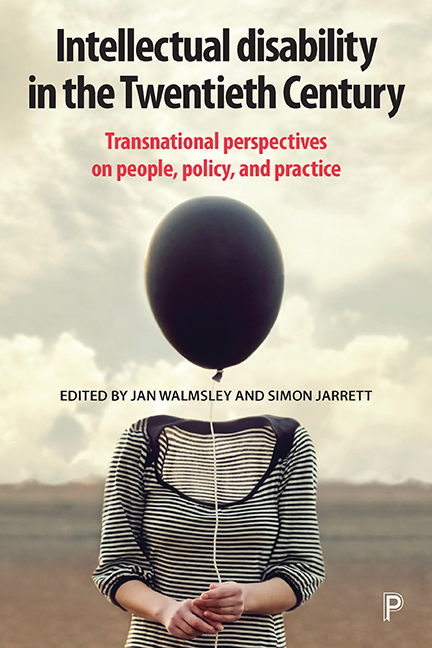 Intellectual Disability in the Twentieth Century
Intellectual Disability in the Twentieth Century Book contents
- Frontmatter
- Contents
- Notes on editors and contributors
- Introduction
- one Paradoxical lives: intellectual disability policy and practice in twentieth-century Australia
- two Tracing the historical and ideological roots of services for people with intellectual disabilities in Austria
- three Time of paradoxes: what the twentieth century was like for people with intellectual disabilities living in Czechoslovakia/Czech Republic
- four Intellectual disability in twentieth-century Ghana
- five A Greek Neverland: the history of the Leros asylums’ inmates with intellectual disability (1958–95)
- six Intellectual disability in Hong Kong: then and now
- seven People with intellectual disabilities in the European semi-periphery: the case of Hungary
- eight People with intellectual disabilities in Iceland in the twentieth century: sterilisation, social role valorisation and ‘normal life’
- nine Institutionalisation in twentieth-century New Zealand
- ten ‘My life in the institution’ and ‘My life in the community’: policies and practice in Taiwan
- eleven Intellectual disability policy and practice in twentieth-century United Kingdom
- twelve From social menace to unfulfilled promise: the evolution of policy and practice towards people with intellectual disabilities in the United States
- Index
five - A Greek Neverland: the history of the Leros asylums’ inmates with intellectual disability (1958–95)
Published online by Cambridge University Press: 27 April 2022
- Frontmatter
- Contents
- Notes on editors and contributors
- Introduction
- one Paradoxical lives: intellectual disability policy and practice in twentieth-century Australia
- two Tracing the historical and ideological roots of services for people with intellectual disabilities in Austria
- three Time of paradoxes: what the twentieth century was like for people with intellectual disabilities living in Czechoslovakia/Czech Republic
- four Intellectual disability in twentieth-century Ghana
- five A Greek Neverland: the history of the Leros asylums’ inmates with intellectual disability (1958–95)
- six Intellectual disability in Hong Kong: then and now
- seven People with intellectual disabilities in the European semi-periphery: the case of Hungary
- eight People with intellectual disabilities in Iceland in the twentieth century: sterilisation, social role valorisation and ‘normal life’
- nine Institutionalisation in twentieth-century New Zealand
- ten ‘My life in the institution’ and ‘My life in the community’: policies and practice in Taiwan
- eleven Intellectual disability policy and practice in twentieth-century United Kingdom
- twelve From social menace to unfulfilled promise: the evolution of policy and practice towards people with intellectual disabilities in the United States
- Index
Summary
Introduction
On 10 September 1989, a Greek scandal made headlines in the British Observer newspaper; the article's title was ‘Europe's Guilty Secret’ and the front page depicted several naked male mental patients looking desperate, wandering around the Leros Psychiatric Hospital buildings in Lepida. The piece described the appalling living conditions under which the patients struggled to survive for years. ‘Hundreds of mentally ill and handicapped men, women and children,’ it read, ‘have been left to rot in concentration camp conditions on a remote Greek island. The full horror of the plight of the lost souls on the Aegean island of Leros, 172 miles south-east from the mainland port of Piraeus, is revealed today after two Observer journalists gained access to the hospital’ (Merritt, 1989a, 1989b).
This ‘guilty secret’ had in fact been known in Greece long before 1989. A group of young Leros doctors and deinstitutionalisation activists had presented the situation in a Greek-French symposium on social psychiatry, organised by the renowned psychiatrist and psychoanalyst Panayotis Sakellaropoulos in December 1981 (Sakellaropoulos, 1984, 1990). An article about Leros accompanied by disturbing pictures had appeared on the front page of Eleftherotypia, one of the most widely circulated newspapers in the country, as early as June 1983 (Leriaka Nea, 1983; Eleftherotypia, 1983). Also in 1983, the newly elected socialist government had introduced Law 1397 providing for the creation of the Greek National Health System, which included Article 21 providing for the organisation and reform of psychiatric services, while in 1984 it even managed to receive ‘exceptional financial support in favour of Greece in the social field’ from the European Community, based on EEC Regulation 815/84 (Government Gazette, 1983; Official Journal of the European Communities, 1984). As the French philosopher Felix Guattari (2015, p 50) notes in his Leros diaries in October 1989, ‘the Observer journalist had to look for old pictures for his piece, since Pavilion 16, some sort of ‘snake pit’ [fosse aux serpents], where 165 patients, naked and crammed like cattle, lived for years, does not exist any more.’
- Type
- Chapter
- Information
- Intellectual Disability in the Twentieth CenturyTransnational Perspectives on People, Policy, and Practice, pp. 79 - 98Publisher: Bristol University PressPrint publication year: 2019


